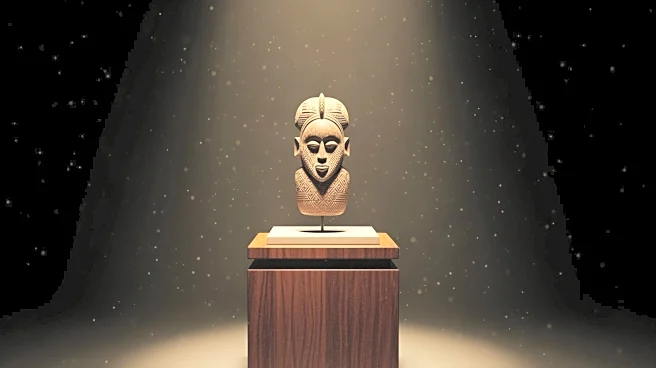What's Happening?
Private collectors have returned 130 gold and bronze artefacts to Ghana's Asante Kingdom, a move celebrated by heritage experts. The artefacts, including royal regalia, drums, and ceremonial gold weights, date back to the 1870s. British art historian
Hermione Waterfield and South African mining company AngloGold Ashanti facilitated the repatriation. This action underscores the cultural significance of these items and highlights the UK government's slow progress in enabling national museums to return similar artefacts. Dan Hicks, an author on restitution, views this as a landmark moment in the ongoing struggle for the return of looted objects. Despite the UK's Culture Secretary stalling on museum returns, private individuals and non-national museums are advancing in repatriation efforts.
Why It's Important?
The return of these artefacts is significant as it challenges the status quo of artefact restitution, particularly in the UK. It raises questions about the ethical responsibilities of museums and private collectors in repatriating cultural items. The move could inspire other countries to claim restitution for objects held in private collections, potentially leading to a broader shift in how cultural heritage is managed globally. Caroline Angle Maguire, a historian, notes that unclear provenance often hinders repatriation, but the cultural importance of these items has outweighed such concerns in this case. This development may encourage more ethical returns, even when provenance is not directly linked to looting.
What's Next?
The return of artefacts to Ghana may prompt other countries to seek restitution for cultural items held abroad. It could lead to increased pressure on national museums and private collectors to disclose inventories and provenance information. The UK government may face growing calls to facilitate the return of artefacts from national museums, potentially leading to policy changes. Heritage experts hope this will inspire more ethical returns, encouraging museums and collectors to prioritize cultural significance over provenance issues.
Beyond the Headlines
This event highlights the ethical dimensions of cultural heritage restitution, challenging the traditional reliance on provenance as a barrier to repatriation. It may lead to a reevaluation of how cultural items are valued and returned, emphasizing their importance to source communities. The move could also influence legal frameworks governing artefact restitution, encouraging more transparent and ethical practices in the art market.

















